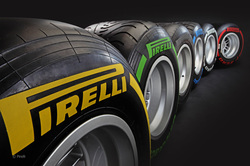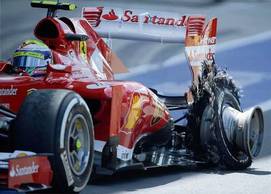Following Sunday’s victory at Spa, it’s probably safe to say that Sebastian Vettel and Red Bull will win both the Driver’s and Constructor’s championships for the fourth year in a row. The German’s dominant performance yesterday now has him 46 points clear of nearest rival, Ferrari’s Fernando Alonso. However, despite Vettel’s supreme racing skills, it has been Pirelli tyres and not his driving, which have dominated the F1 headlines since the season began in Melbourne last March.
For those unfamiliar with the sport, tyres have not surprisingly always been a key element of the racing game. Historically, successful cars have been driven to championship success using a variety of different brands such as Bridgestone, Michelin and Goodyear.

So why the problems this year?
Well, the answer is quite simple and can be found by applying the economic tools of competition. In recent years, the public and media have questioned the value of Formula One, when drivers were driving on what we shall call “old tyres”. These tyres were durable rubbers, allowing drivers to pit twice, or in some instances just once, during the course of a race. Fans complained that this was leading to uncompetitive, boring races that saw little change in the order.
Enter the FIA. The governing body wished to address this situation and approached Pirelli. The tyre manufactures was asked to make tyres ‘less durable’ so races would be more exciting. Drivers are now driving on what we shall call “new tyres”. The problem with these new tyres is that they are regularly puncturing or blowing out and require three to four pits stops per race. The result has been that some races have descended into chaos.

The question of competitive balance, implicitly mentioned in this piece, is an interesting one for fans of F1 and all the more so when one considers that if Vettel wins again this season, two men both of whom are German, have one ten of the last twenty drivers’ championship. How more uncompetitive could it be?
 RSS Feed
RSS Feed